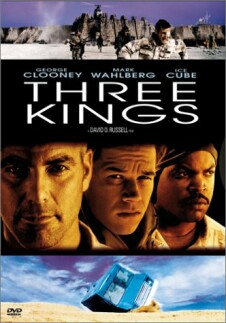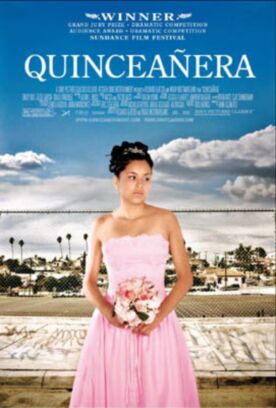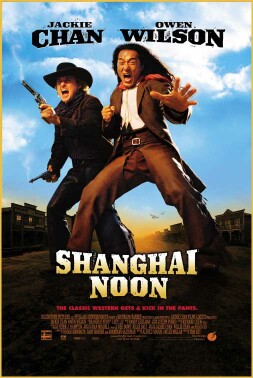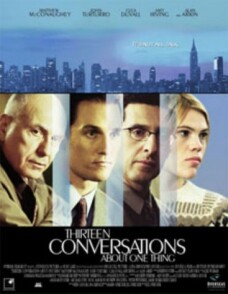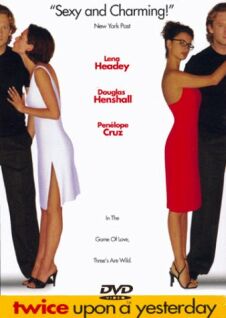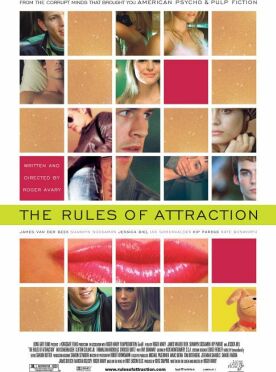Three Kings
Three Kings, written and directed by David O. Russell begins with a
quasi- documentary moment. We see, off in the distance, a soldier with a weapon
in his hand waving it aloft — we cannot tell whether it is as a gesture of
surrender or threat — as Sgt Troy Barlow (Mark Wahlberg) in full battle gear
asks someone off camera, “Are we shooting?” The hand-held camera suggests that
he is talking to a film producer, but it soon becomes apparent that he means
“shooting” as in shooting. Getting no definitive answer to his question,
he shoots anyway. The distant soldier falls. The sergeant runs up to have a look
at his handiwork and finds the enemy in his death throes, bleeding profusely
from the neck. It is a shocking spectacle, even for those inured to sight of
cinematic blood and death.
This is only one of several moments in the film in which Russell confirms the
impression of his first two pictures, Spanking the Monkey and Flirting
with Disaster, that he is a young filmmaker of rare talent. It also
brilliantly sets the stage for what is to follow: the sense of confusion and
uncertainty, of casually inflicted horror and death, of media hungry for
gruesome imagery and of political chaos — the dying soldier is an Iraqi
trying to surrender in accordance with the cease-fire that ended the Gulf War.
But for all its cleverness, the film is ultimately unsatisfying, for its
political point depends to an unusual extent on how accurate it is as a factual
representation of what went on in the closing days of the war, and that most of
us are not in a position to judge.
It would have been better if Russell had made his subject simply what
military historians call “the fog of battle.” But it is also understandable that
he was tempted into the political realm by the fact that the fog of this
particular battle was, for political reasons, a real pea-souper. The allied
troops were allowed by the necessities of Arab politics to go so far and no
further; the enemy was beaten but still locally powerful. Above all, Saddam
Hussein had retained his grasp on power and so had to be conciliated even as his
armies were surrendering. The Bush administration and the allied forces made the
unforgivable mistake of encouraging anti-Saddam forces, especially Shi’ites in
the south, to rise up against the tyrant when they lacked the political means or
the will to help them. They were ruthlessly crushed.
Into this confused situation, Russell puts four American
soldiers — besides Barlow there are a Special Forces major called Archie
Gates (George Clooney) and two other enlisted men, Chief Elgin (Ice Cube) and
Conrad Vig (Spike Jonz) — who get hold of a map which they believe will take
them to Saddam Hussein’s gold store. Why Hussein would have been foolish enough
to put his gold, conveniently transportable in the form of gold bricks, in a
bunker within an easy drive of the front line and (apparently) hardly guarded at
all is briefly troubling to the imagination, but acceptable as the film’s
donné. At any rate, it gives our heroes an excuse for cruising among the armed
but uncertain Iraqi troops and terrified civilians, some of whom are still being
imprisoned and tortured by Saddam’s men. Neither the oppressed nor their
oppressors are quite sure what to do when the Americans arrive.
The best part of the film is its presentation of these civilians, who are
given a moment of hope by the arrival of the Americans but who (rightly, as it
turns out) are also skeptical of their ability or willingness to help. Major
Gates catechizes his ad hoc unit of fortune-seekers by asking them
“What’s the most important thing in life?”
Chief, a religious nut, answers: “The will of God.”
“Close,” says Gates approvingly. “Necessity. People do what is most necessary
for them at any given moment.” Hence, he reasons, the Iraqi troops among whom
they propose to venture will concern themselves with the necessity of the
moment, putting down anti- Saddam rebellions and leave them alone while they
waltz in and carry off the gold. This daring plan helps to make us forget not
only the inherent improbability of finding a cache of gold in such a place and
the further improbability of getting it out of the country not only unmolested
by the Iraqis but undetected by the Americans. It almost works too, until it
becomes clear to them that the rebels who see them as liberators will be
tortured and killed unless they help them. And, of course, they cannot help them
without giving up the gold that brought them there in the first place.
It is a classic moral dilemma, and full marks to Russell for being unashamed
of it — for making, moreover, this unprepossessing crew of adventure- seeking
GIs capable of responding to it in a sympathetic way. But the political subtext
acts as something of a distraction from the film’s more serious purposes
(wouldn’t the moral dilemma faced by these men be the same even if there had
been no larger American betrayal of the rebels?), as does the presence of a
television reporter, Adriana Cruz (Nora Dunn), who is there for some routine
satire of “the media” before making her contribution to the dénouement.
Too much is going on here, and so Russell diminishes the emotional impact of the
most harrowing and moving part of the film, which is the confrontation between
Barlow and an Iraqi torturer who unexpectedly finds the American at his mercy.
This alone is worth the price of admission, but Russell bedecks it with too many
frills — comic jeux as well as political tendentiousness — to get
the full value of it.
Discover more from James Bowman
Subscribe to get the latest posts to your email.

